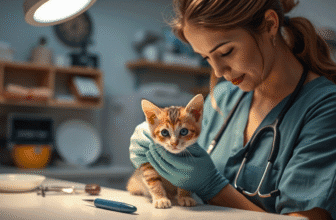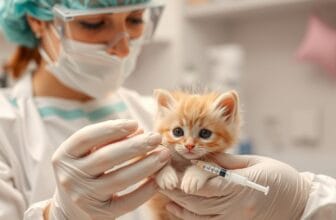
Table of Contents
Would you risk your tiny kitten’s life by skipping crucial vaccinations? Every new kitten owner faces a critical decision. This decision could mean the difference between health and potential disease.
Kittens are incredibly vulnerable during their first six months of life. A comprehensive kitten vaccination schedule is your primary defense. It protects against dangerous infectious diseases that can threaten your furry friend’s survival. Understanding cat vaccines becomes essential for protecting your newest family member.
Your kitten shots are more than just medical procedures—they’re a shield against potentially fatal health risks. Professional veterinarians recommend a strategic approach to vaccination. This approach builds your kitten’s immune system gradually and effectively.
This guide will walk you through every critical stage of the kitten vaccination schedule. It helps you make informed decisions about your pet’s health. From understanding which vaccines are necessary to knowing exactly when to schedule them, you’ll gain the knowledge needed. This knowledge will keep your kitten safe and thriving.
Understanding the Importance of Kitten Vaccinations
Protecting your kitten’s health starts with understanding the critical role of vaccinations. These medical interventions are your first line of defense against dangerous diseases. They can threaten your furry friend’s life.
The importance of kitten vaccines cannot be overstated. Young cats are extremely vulnerable to health threats in their first months of life. Vaccines provide essential protection. They build a strong immune system and prevent serious illnesses.
Why Vaccines Are Critical for Kitten Health
Vaccines work by stimulating your kitten’s immune system to fight specific diseases. They create a shield against fatal conditions such as:
- Feline panleukopenia
- Respiratory infections
- Feline leukemia
- Rabies
How Maternal Immunity Works
Maternal immunity in kittens is a fascinating natural protection mechanism. Kittens receive antibodies from their mother’s milk when they nurse. These antibodies provide initial defense against diseases during the first few weeks of life.
Interestingly, these same protective antibodies can interfere with early vaccination efforts. Veterinarians carefully time vaccine administration.
When Immunity Protection Begins to Fade
Fading immunity is a natural process where maternal antibodies gradually decrease. This typically occurs around 6-8 weeks of age. Kittens become more susceptible to infections as their inherited immune protection wanes.
Your veterinarian will help you navigate this crucial transition. They ensure your kitten receives the right vaccines at the right time. This maintains continuous protection.
Core vs. Non-Core Vaccines for Kittens
Keeping your kitten healthy starts with knowing about kitten shots. Vets divide cat vaccines into two main types: core kitten vaccines and non-core cat vaccinations.
Core kitten vaccines are must-haves for every kitten. They guard against serious diseases that can be deadly. These vaccines are vital for all kittens, no matter where they live or play.
- Core vaccines include:
- FVRCP (Feline Viral Rhinotracheitis, Calicivirus, Panleukopenia)
- Rabies vaccine
Non-core cat vaccinations depend on your kitten’s risk level. Your vet will look at things like:
- Where you live
- If your kitten goes outside
- Risks of catching diseases
Typical non-core vaccines might include:
- Feline Leukemia Virus (FeLV)
- Feline Immunodeficiency Virus (FIV)
- Bordetella
Talking to a vet is the best way to figure out your kitten’s vaccine needs. They can help choose the right shots for your kitten’s health.
Kitten Vaccination Schedule: Week-by-Week Guide
Protecting your kitten’s health starts with a comprehensive vaccination schedule. Knowing when to give the first shots is key to strong immunity and disease prevention. Your vet will guide you through the kitten vaccine schedule for full protection.
Kittens go through several stages of vaccination. Each shot is important for building immunity. They need booster shots to stay safe from health risks.
6-8 Weeks: First Vaccinations
At this stage, your kitten gets their first core vaccines. The main vaccines include:
- FVRCP (Feline Viral Rhinotracheitis, Calicivirus, Panleukopenia) vaccine
- First round of essential immunizations
- Initial health assessment by a veterinarian
9-12 Weeks: Booster Shots
Your kitten’s immune system keeps growing. Booster shots during this time strengthen their protection against diseases.
| Vaccine Type | Purpose | Importance |
|---|---|---|
| FVRCP Booster | Respiratory Protection | Critical for preventing viral infections |
| Additional Core Vaccines | Comprehensive Immunity | Strengthens immune response |
12-16 Weeks: Final Core Vaccines
The last part of the kitten vaccine schedule is completing core immunizations. This includes:
- Rabies vaccination
- Final FVRCP booster
- Comprehensive health evaluation
Pro tip: Always consult your veterinarian to customize the kitten vaccine schedule based on your pet’s specific health needs and lifestyle.
FVRCP Vaccine: The Essential Three-in-One Protection
The FVRCP vaccine is a key defense for your kitten’s health. It protects against three serious feline viral diseases. These diseases can greatly affect your cat’s health.
So, what does the FVRCP vaccine cover? Let’s look at its main parts:
- Feline Viral Rhinotracheitis (FVR): A herpes virus causing severe respiratory infections
- Calicivirus: Another respiratory disease causing painful mouth ulcers
- Panleukopenia: Often called feline distemper, a potentially fatal intestinal virus
Vets say the cat rhinotracheitis vaccine is a must for all kittens. The feline distemper vaccine part fights panleukopenia. This is very dangerous for young cats with still-growing immune systems.
“Prevention is always better than cure when it comes to your kitten’s health.” – Veterinary Infectious Disease Experts
Your kitten will get the FVRCP vaccine in a series of shots early in their life. These shots help build strong immunity against these serious diseases.
After the shot, watch for mild side effects like a slight fever or temporary tiredness. These signs mean your kitten’s immune system is working to protect them.
Understanding the Rabies Vaccine Requirements
Rabies is a deadly disease that can harm cats and humans. It’s crucial to vaccinate your kitten on time. This is not just a health tip but also a legal rule in many places.
Getting your kitten vaccinated against rabies is key to being a good pet owner. Knowing the laws and health benefits helps you meet the cat rabies shot needs.
State Laws and Regulations
Different states have their own rules about rabies shots for cats. Most states require all cats to be vaccinated. The main rules are:
- First rabies vaccine given between 12-16 weeks
- First shot followed by booster shots
- Proof of vaccination needed for a license
Timing of First Rabies Shot
Your vet will tell you when to give your kitten the first rabies shot. Kittens usually get their first shot around 12 weeks of age. This makes sure the vaccine works well and follows state rules.
Booster Requirements
After the first shot, your cat needs regular booster shots to stay protected. The usual schedule is:
- First booster: 1 year after the first shot
- Next boosters: Every 1-3 years, based on local laws
Keeping up with rabies shots keeps your kitten and your family safe from this deadly disease.
FeLV Vaccination: What Every Owner Should Know

Feline leukemia virus (FeLV) is a big health risk for cats. The FeLV vaccine is key for protecting kittens, especially those that go outside or meet other cats. Knowing about feline leukemia vaccination helps you protect your cat’s health.
Not every cat needs the cat leukemia shot. But, some cats face higher risks. Your vet will decide if your cat needs the vaccine based on their situation.
- Outdoor cats have higher exposure risks
- Multi-cat households increase transmission potential
- Stray or rescue cats need careful screening
Getting your cat vaccinated for feline leukemia involves a few steps. First, your vet will test your cat for FeLV. Then, they can start the vaccine, usually when your cat is 8 to 12 weeks old.
| Age Range | FeLV Vaccination Recommendation |
|---|---|
| 8-12 weeks | Initial vaccination possible |
| 12-16 weeks | Booster shot recommended |
| Adult cats | Annual or triennial boosters based on risk |
High-risk cats need more shots. Indoor cats might need shots less often. But, cats that go outside or meet other cats need more protection.
Talking to your vet is the best way to figure out the right vaccine schedule for your cat. They’ll consider your cat’s lifestyle and health.
Cost Considerations for Kitten Vaccinations
Keeping your kitten healthy has a cost. Knowing the costs of kitten vaccinations helps you plan for your pet’s medical needs. The prices for cat vaccines depend on several factors that pet owners should understand.
Veterinary fees for kitten shots usually range from $75 to $250 in the first year. This cost covers important care that keeps your kitten safe from diseases.
Vaccine Price Breakdown
- Core vaccines: $25-$50 per vaccine
- Rabies vaccine: $15-$35
- FeLV vaccine: $25-$45
Additional Veterinary Expenses
There are more costs beyond vaccine prices for your kitten’s health:
- Initial physical examination: $40-$60
- Wellness check-ups: $50-$100
- Potential follow-up visits: $30-$75
Cost-Saving Strategies
To save on kitten vaccination costs, try these options:
- Low-cost vaccination clinics
- Pet insurance wellness plans
- Annual vaccine packages from veterinary clinics
Pro tip: Always compare prices and ask your veterinarian about bundled vaccine packages to reduce overall expenses.
Managing Vaccination Side Effects
Kitten vaccine side effects are usually mild and don’t cause serious problems. Most cats have little to no reaction after getting vaccinated. Knowing what to expect helps you care for your kitten better and keep them comfortable.
After your kitten gets vaccinated, you might see some common reactions. These include:
- Slight lethargy or reduced energy
- Mild fever
- Temporary soreness at injection site
- Small, soft lump where the shot was given
Even though most side effects are okay, some need quick vet help. Look out for these signs:
- Persistent vomiting
- Difficulty breathing
- Significant swelling
- Extreme weakness
To help your kitten recover, try these gentle care tips:
- Create a quiet, comfortable resting area
- Ensure fresh water is always available
- Monitor temperature and behavior
- Offer soft, easily digestible food
Most kittens get over vaccine side effects fast. Usually, any mild reactions go away in 24-48 hours. If your kitten’s symptoms don’t get better or get worse, call your vet right away.
| Reaction Type | Normal/Concerning | Recommended Action |
|---|---|---|
| Mild Fever | Normal | Rest and Observation |
| Significant Swelling | Concerning | Veterinary Consultation |
| Temporary Lethargy | Normal | Gentle Care |
Remember, keeping a close eye on your kitten and getting vet advice is crucial. It helps make sure your kitten’s vaccination experience is safe and smooth.
Indoor vs. Outdoor Cats: Tailoring the Vaccine Schedule
Your kitten’s lifestyle is key to picking the right vaccines. Indoor and outdoor cats face different health risks. This means their vaccination needs can vary a lot.

Knowing your cat’s environment helps vets make a custom vaccine plan. Vaccination plans can’t be the same for every cat.
Risk Assessment Factors
Environments pose different health risks to kittens. Think about these when deciding on vaccines:
- How often they go outside
- How much they interact with other cats
- Any wildlife they might meet
- The local disease rates
Additional Protection Needs
Outdoor cats need more vaccines. Indoor cats might need fewer. But outdoor kittens are at higher risk for diseases.
“A cat’s vaccination plan should be as unique as the cat itself.” – Veterinary Immunology Expert
Outdoor cats might need:
- Feline Leukemia (FeLV)
- Rabies
- Bordetella
- Chlamydia
Always talk to your vet to find the best vaccine schedule for your kitten.
Vaccination Records and Documentation
Keeping up with your kitten’s vaccination records is key for their health and legal needs. Your pet vaccine certificates are vital. They show your kitten’s vaccination history and keep them safe.
Good kitten shot documentation has a few important parts:
- Veterinarian’s contact information
- Kitten’s name and breed
- Vaccination dates
- Vaccine type and manufacturer
- Batch number of each vaccine
- Next recommended vaccination date
Having both digital and physical copies of your kitten’s vaccination records is best. Many vets offer online portals for this. Having these documents in both formats keeps you ready.
Pet vaccine certificates are important in many situations:
- Traveling with your kitten
- Enrolling in pet daycare
- Boarding at kennels
- Registering for pet insurance
- Changing veterinary clinics
Make a special folder or digital file for your kitten’s medical records. It helps you keep track of their health. And it’s easy to find during emergencies.
Common Myths About Kitten Vaccinations
Kitten vaccination myths can confuse pet owners about important health choices. Knowing the truth about cat vaccines is key to keeping your pet safe and healthy.
Many pet owners believe false things about feline vaccinations. Let’s clear up some common kitten vaccination myths that could harm your cat’s health:
- Myth: Indoor cats don’t need vaccines
Reality: Indoor cats still need core vaccinations. Viruses can get into your home through shoes, other animals, or open windows. This could expose your kitten to serious diseases.
- Myth: Vaccines cause autism in cats
Scientific evidence shows this is not true. Veterinary researchers have found no link between vaccinations and autism in cats. This myth comes from misunderstood medical information.
- Myth: One set of shots provides lifelong immunity
Cats need regular booster shots to stay protected. Immunity fades over time, so regular vaccinations are key for ongoing health.
Vets strongly advise sticking to a full vaccination schedule. Debunking feline vaccination myths means understanding vaccines are safe and vital. They help protect your kitten from deadly diseases.
Consult your veterinarian for personalized vaccination advice tailored to your kitten’s specific health needs.
By clearing up these cat vaccine misconceptions, you can make better choices. This will help keep your kitten healthy and happy for years to come.
Multi-Cat Households: Special Vaccination Considerations
Vaccinating multiple cats in one home needs careful planning. Your cats need full protection against diseases. Kitten shots in multi-cat homes require extra care to ensure each cat gets the right shots.

- Check each cat’s health
- Plan a vaccination schedule together
- Watch for cross-infection risks
- Use quarantine for new cats
Introducing a new kitten to your home needs special steps. Your cats’ health depends on regular and complete vaccinations.
| Vaccination Stage | Multi-Cat Household Recommendation |
|---|---|
| Initial Kitten Shots | Stagger vaccination dates to minimize stress |
| Booster Vaccines | Synchronize schedules for uniform protection |
| Annual Check-ups | Comprehensive health screening for all cats |
Remember, protecting one cat means protecting the entire feline household. Regular vet visits are key to a good vaccination plan for your home.
When to Delay or Avoid Vaccinations
Vaccines are key to your kitten’s health. But, there are times when you should wait or skip them. Knowing when is important for your kitten’s safety.
Vaccines are vital, but your vet might suggest waiting. This is based on your kitten’s health.
Health Conditions Affecting Vaccination Timing
Some health issues can make vaccines risky for your kitten. You might need to wait if your kitten has:
- Active fever or acute illness
- Recent surgical procedures
- Ongoing infections
- Severe stress or significant health changes
- Autoimmune disorders
Emergency Situations Requiring Vaccine Postponement
Your vet will check if vaccines are safe in certain situations. This includes:
- Severe allergic reactions to previous vaccines
- Compromised immune system
- Concurrent medical treatments
- Recovery from serious health conditions
“Always consult with a professional veterinarian to determine the safest vaccination approach for your unique kitten.” – Veterinary Health Experts
Getting expert advice is vital for your kitten’s vaccination schedule. Your vet can tailor advice to your kitten’s health needs. This ensures they get the best protection.
Maintaining Immunity Through Adult Years
Keeping your cat healthy doesn’t end when they’re a kitten. Adult cat vaccinations are vital for keeping their immune system strong. Regular booster shots help protect against serious diseases.
Vets suggest a custom plan for adult cat vaccinations. The booster shot schedule depends on several things:
- Your cat’s lifestyle (indoor vs. outdoor)
- Overall health status
- Risk of exposure to specific diseases
- Type of vaccine administered
Most core vaccines need to be updated every 1-3 years. Your vet can figure out the best schedule for your cat.
| Vaccine Type | Typical Booster Interval | Importance |
|---|---|---|
| FVRCP | Every 3 years | High protection against respiratory diseases |
| Rabies | Every 1-3 years | Legal requirement in most states |
| FeLV | Annually for high-risk cats | Critical for outdoor or multi-cat households |
Titer testing is another option. It checks your cat’s immunity levels through a blood test. Regular vet visits are crucial for your cat’s long-term health.
Protecting your feline friend is a lifelong commitment that extends far beyond the kitten years.
Conclusion
Protecting your kitten’s health starts with understanding the critical role of feline immunization. Kitten vaccination importance cannot be overstated. These essential medical interventions shield your furry friend from potentially life-threatening diseases. Your proactive approach to cat health protection begins with a comprehensive vaccination strategy tailored to your kitten’s specific needs.
Each vaccine plays a crucial part in building a robust immune system. From core vaccines like FVRCP to rabies and FeLV protection, your veterinarian will guide you through the most appropriate immunization schedule. Remember, these vaccinations are more than just medical procedures. They’re an investment in your kitten’s long-term health and happiness.
As your kitten grows, continue to work closely with your veterinary professional. Stay informed about recommended boosters, potential side effects, and emerging health considerations. The comprehensive feline immunization summary you’ve learned provides a solid foundation for ensuring your kitten develops into a healthy adult cat, ready to enjoy a lifetime of adventures and companionship.
Your commitment to understanding and following a strategic vaccination plan demonstrates your dedication as a responsible pet owner. By prioritizing your kitten’s health through timely and appropriate immunizations, you’re setting the stage for a vibrant, resilient companion who can thrive in both indoor and outdoor environments.
FAQ
How many vaccines do kittens really need?
Kittens need core vaccines like FVRCP and rabies. These are given in doses from 6-16 weeks old. Vets suggest at least three rounds to ensure full protection. Booster shots are then given to keep immunity strong.
Are vaccines safe for my kitten?
Vaccines are safe and key to preventing serious diseases. Mild side effects like tiredness or soreness can happen. But, severe reactions are rare. Vaccines are much safer than the diseases they prevent.
Do indoor kittens really need vaccinations?
Yes, indoor kittens need vaccines. They can get viruses from air, clothes, or other pets. Vaccines protect against deadly diseases that can come into your home.
How much do kitten vaccinations cost?
Vaccination costs are between to 0 for the first series. Prices vary by location and clinic. Some places offer cheaper options to help with costs.
When should I start vaccinating my kitten?
Vaccinations start at 6-8 weeks. The series includes booster shots every 3-4 weeks until 16 weeks. Your vet will make a schedule based on your kitten’s needs.
Can vaccines cause autism in cats?
No, this is a false myth. There’s no link between vaccines and autism in cats. Vaccines are safe and protect your kitten’s health.
What is the FVRCP vaccine?
FVRCP protects against three serious diseases: herpes virus, Calicivirus, and feline distemper. It’s a single shot that keeps your kitten safe from life-threatening illnesses.
How long do kitten vaccinations provide protection?
The first series protects for about a year. Then, booster shots are needed. Some vaccines last longer, while others need yearly boosters. Your vet will plan the best schedule for your cat.
Are there risks to over-vaccinating my kitten?
While vaccines are important, vets now tailor vaccination plans. Titer tests help find the right time for shots. This way, your kitten gets the right amount of protection without over-vaccination risks.
What should I do if my kitten misses a vaccination?
If your kitten misses a shot, call your vet right away. They can reschedule and adjust the plan. Usually, a little delay won’t hurt your kitten’s immunity too much.







